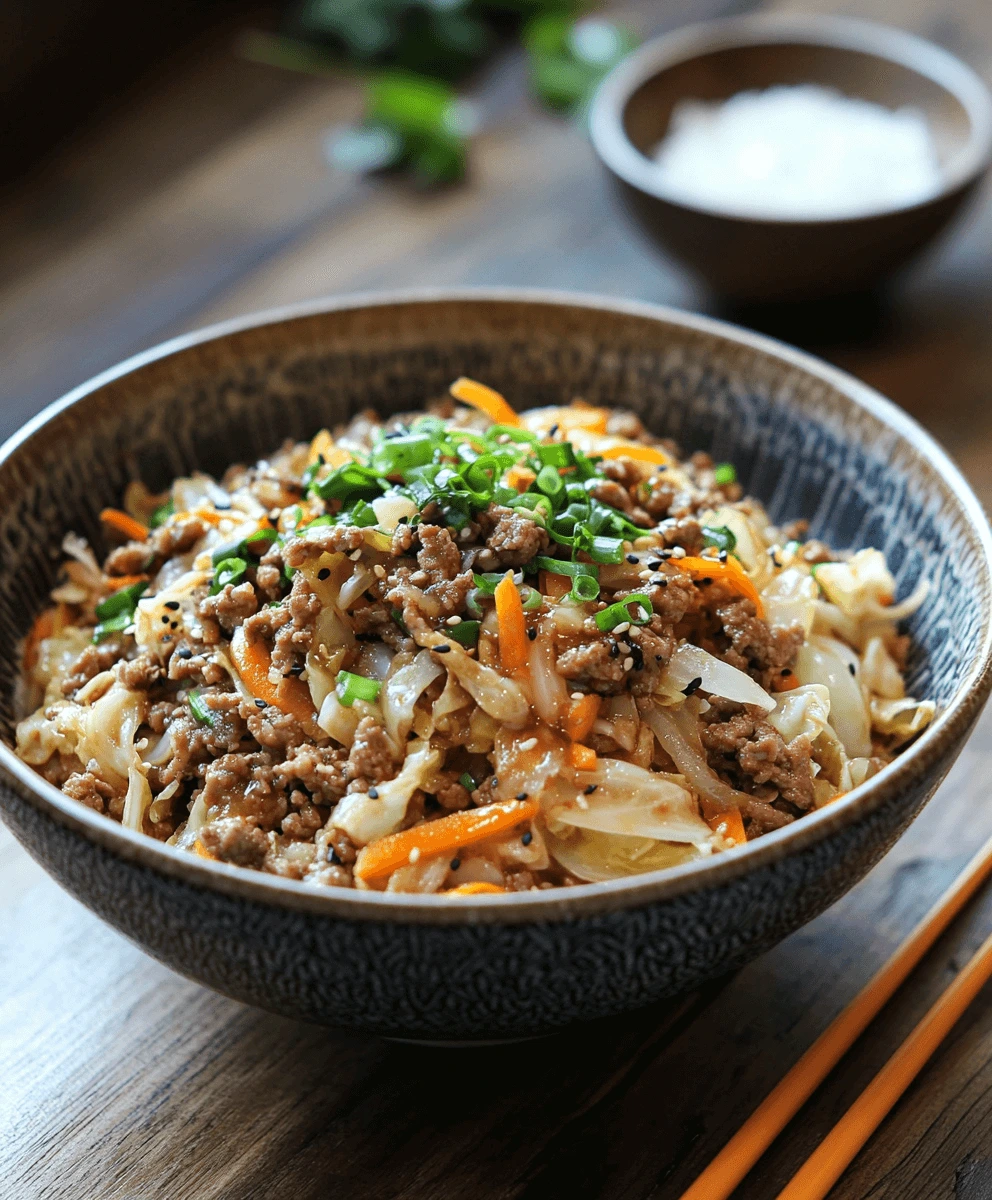Beef and cabbage are a culinary duo celebrated in kitchens worldwide for their affordability, versatility, and bold flavors. From hearty soups to savory stir-fries, this pairing forms the foundation of countless comforting meals.
But why is the combination of beef and cabbage so popular? Beyond their robust taste, these two ingredients offer a nutritional powerhouse while remaining budget-friendly and adaptable to a variety of cuisines. Therefore, it is no surprise that they have become staples in meal planning across cultures.
In this article, we’ll explore whether this combination is as healthy as it is delicious by diving into the nutritional benefits and practical advantages of incorporating ground beef and cabbage into your meals.
Nutritional Breakdown
Beef Nutrition
Ground beef is a rich source of essential nutrients, making it a staple for many households. For instance, it provides:
- Protein: Vital for muscle growth and repair. A 3-ounce serving of cooked ground beef delivers about 22 grams of protein, which is significant for daily needs.
- Iron: Supports oxygen transport in the blood, helping combat fatigue and increasing energy.
- Zinc: Strengthens the immune system and aids in cell repair, particularly during recovery.
- B Vitamins: Especially B12, which is essential for energy production and brain health.
Pro Tip: Nutritional value varies based on the cut and fat content. For example, leaner cuts like 90% lean ground beef offer lower fat content, while higher-fat options can provide more flavor.
Cabbage Nutrition
Cabbage is a low-calorie, nutrient-dense vegetable packed with health benefits. In particular, it offers:
- Vitamin C: An antioxidant that boosts immunity and improves skin health.
- Vitamin K: Crucial for blood clotting and bone strength, especially as we age.
- Fiber: Supports digestion and promotes satiety, making it a great addition to weight management plans.
- Antioxidants: Helps reduce inflammation and fight oxidative stress, particularly in chronic conditions.
Fun Fact: Cabbage is versatile in preparation and cooking, allowing its nutrients to shine whether raw, sautéed, or simmered.
Part 2: Health Benefits of Beef and Cabbage
Digestive Health
One of the standout benefits of cabbage is its high fiber content, which plays a crucial role in promoting gut health. Dietary fiber helps regulate bowel movements, preventing constipation and supporting a healthy microbiome. Specifically, cabbage contains both soluble and insoluble fibers, which contribute to improved digestion and nutrient absorption.
On the other hand, ground beef complements this by providing essential nutrients without overwhelming the digestive system. Its high protein content is easily digested and utilized by the body. This pairing of fiber-rich cabbage and easily digestible beef supports a well-rounded approach to digestive wellness. For more on maximizing nutritional value, check out these cooking tips for ground beef.
Weight Management
Cabbage is ideal for weight management due to its low-calorie density. For instance:
- One cup of chopped cabbage contains only 22 calories, making it an excellent option for adding bulk to meals without increasing calories significantly.
- High-protein beef enhances satiety, meaning it helps you feel full for longer.
This combination is perfect for creating calorie-conscious meals that are also satisfying. High-protein foods like ground beef help reduce overeating by keeping you full, while cabbage adds volume without additional calories. To learn more about creating cost-effective, healthy meals, visit budget-friendly recipes.
Heart Health
Cabbage is loaded with nutrients like potassium, which helps reduce blood pressure by balancing the effects of sodium. Additionally:
- Antioxidants in cabbage reduce inflammation, a significant factor in heart disease.
- Polyphenols in cabbage also support cardiovascular health.
When choosing ground beef, opt for lean cuts (such as 90% lean or higher) to minimize saturated fat intake, which can impact cholesterol levels. By combining lean beef with heart-healthy cabbage, you create dishes that not only taste great but also promote long-term heart health.
Immunity Boost
Cabbage is a powerhouse of immune-boosting nutrients, including:
- Vitamin C: Supports immune function and speeds up recovery from illnesses.
- Antioxidants: Combat oxidative stress and reduce inflammation.
Meanwhile, ground beef contributes:
- Zinc: Aids in the activation of immune cells.
- Vitamin B12: Necessary for red blood cell production and DNA synthesis.
Together, beef and cabbage provide a potent combination of immune-boosting properties that help you stay healthy year-round.
Balanced Meals and Versatility
One of the best reasons to cook with beef and cabbage is their ability to create nutrient-dense and balanced meals. This combination provides:
- Protein from beef for muscle repair and energy.
- Fiber and antioxidants from cabbage for digestion and overall health.
Additionally, this pairing is incredibly versatile:
- Stir-fries: Quick and flavorful.
- Soups: Hearty and comforting.
- Casseroles: Cheesy and satisfying.
These dishes are not only healthy but also budget-friendly, ensuring everyone can enjoy nutritious meals without overspending. Whether you’re preparing a quick dinner or batch-cooking for the week, this duo delivers on flavor, nutrition, and practicality.
By combining cabbage and beef, you can create meals that are not only delicious but also support digestive health, weight management, and heart health. These affordable, versatile ingredients make it easy to maintain a nutritious and satisfying diet.

Considerations When Eating Beef and Cabbage
Cooking Methods Matter
The way you prepare beef and cabbage significantly impacts the healthiness of your meals. Health-conscious cooking methods, such as:
- Grilling: Adds a smoky flavor while minimizing the use of oils.
- Steaming: Retains the nutrients in cabbage without adding extra fats.
- Stir-frying: Quickly cooks both ingredients, preserving their texture and nutritional value while using minimal oil.
It’s best to avoid frying, as it often involves high-fat oils and can drastically increase calorie content. By choosing these healthier cooking techniques, you can enjoy flavorful meals without compromising your health goals. For more tips on nutrient-rich cooking, visit this guide on how to cook ground beef.
Sodium and Processed Options
While fresh beef and cabbage are nutrient-dense, certain variations can include unhealthy additives:
- Corned beef: A common ingredient in some cabbage recipes, often contains high levels of sodium. High sodium intake can increase blood pressure and lead to other health risks.
- Processed seasonings: Pre-packaged spice blends may also be loaded with salt and artificial ingredients.
To keep your meals healthier, opt for fresh ground beef and season it with natural herbs and spices. This allows you to control the sodium levels while enhancing the flavor of your dishes.
Individual Dietary Needs
While beef and cabbage are generally well-tolerated and nutritious, they may not suit everyone. Consider the following:
- Allergies or intolerances: Though rare, some individuals may be allergic to beef. Others may experience sensitivities to cruciferous vegetables like cabbage, which can cause bloating or gas.
- Digestive sensitivities: Those with irritable bowel syndrome (IBS) or similar conditions may need to limit high-fiber foods like cabbage to avoid discomfort.
If you have specific dietary needs, it’s important to tailor recipes to fit your preferences and consult a healthcare provider if necessary.
By considering cooking methods, watching sodium levels, and tailoring recipes to individual needs, you can maximize the health benefits of beef and cabbage. These small adjustments ensure your meals remain both delicious and suitable for a variety of diets.
What does eating cabbage do to your body?
Cabbage offers a range of health benefits, making it a valuable addition to your diet:
- Benefits: Its high fiber content promotes digestion, aids in weight loss by increasing satiety, and supports immunity with its vitamin C and antioxidants.
- Cautions: For some, the fiber in cabbage can cause bloating or gas, especially when consumed in large quantities. Cooking cabbage can help reduce this effect by breaking down the fiber.
How healthy is beef for you?
The healthiness of beef depends largely on the cut, preparation method, and portion size:
- Lean cuts like 90% lean ground beef are lower in saturated fats and healthier options compared to fattier cuts.
- Beef is rich in protein, iron, and zinc, essential nutrients that support muscle repair, energy, and immunity.
- Preparing beef with methods like grilling or baking enhances its health value compared to frying. Learn more about beef preparation tips here.
Is cooked cabbage better than raw?
Both cooked and raw cabbage have distinct benefits:
- Raw cabbage retains its vitamin C content and is crunchy, making it a great addition to salads.
- Cooked cabbage, however, is easier to digest and still offers key nutrients like vitamin K and fiber. Cooking can also enhance flavor, especially when sautéed or steamed.
Why do people pair beef and cabbage?
The pairing of beef and cabbage is rooted in historical and cultural traditions:
- In Irish cuisine, the combination is iconic in dishes like corned beef and cabbage, often enjoyed on St. Patrick’s Day.
- Eastern European cuisines use beef and cabbage in stuffed cabbage rolls, showcasing their practicality and flavor.
This duo remains popular due to its affordability, nutritional value, and versatility in recipes across cultures.
Is Beef and Cabbage Good for You?
When it comes to healthy and versatile meals, beef and cabbage often take center stage. Their combination not only delivers a satisfying taste but also offers impressive nutritional benefits. In this article, we’ll explore recipes, meal ideas, and the nutritional perks of this classic pairing.
Quick and Healthy Recipe Ideas
Here are some easy and delicious ways to enjoy beef and cabbage:
- Stir-Fried Beef with Cabbage: A quick, flavorful dish packed with protein and fiber. Add soy sauce, garlic, and ginger for an Asian-inspired twist.
- Cabbage Roll Soup: This hearty soup transforms traditional stuffed cabbage into a one-pot wonder.
- Keto-Friendly Beef with Cabbage Noodles: Replace pasta with shredded cabbage to keep it low-carb and nutrient-dense.
For more inspiration, check out these ground beef and cabbage recipes to expand your repertoire.
Tips for Meal Prep
Prepping meals with beef and cabbage is simple and efficient:
- Freezing and Reheating: Many beef and cabbage dishes freeze well, making them ideal for batch cooking. Portion soups, casseroles, or stir-fries into airtight containers for easy weeknight meals.
- Customizing for Dietary Needs: Adjust recipes to suit your preferences. Opt for lean ground beef to reduce saturated fat or add extra veggies to increase fiber.
For more ideas on creating nutritious and budget-friendly meals, visit Greek yogurt breakfast recipes for complementary options to start your day.
Balanced and Nutritious Meals
Pairing beef and cabbage is an excellent way to create balanced meals that cater to diverse dietary needs. Whether you’re looking for high-protein dishes, low-carb options, or quick comfort food, this duo has you covered.
For more on simple yet delicious meal ideas, explore these chicken and rice recipes for inspiration.
By incorporating these suggestions, you can enjoy the health benefits of beef and cabbage while exploring flavorful recipes that fit seamlessly into your lifestyle.


